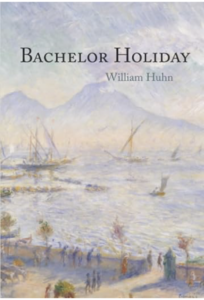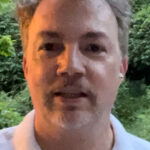Poet William Huhn is helping me wrap up the month with a conversation around his new collection, Bachelor Holiday (from BlazeVOX Books).

Bio:
William Huhn grew up in an old house in Pennsylvania overflowing with books. He studied classical violin from age five, then took up old time fiddle. Shortly after graduating from Vassar College with a chemistry degree, he published his first poem. Uninspired by lab work, he played fiddle across Europe, to finance his poetry. His poems found their way into The Carolina Quarterly, Verse Daily, Talking River Review, 34th Parallel, and elsewhere, and they form the backbone for his first full-length collection, Bachelor Holiday (BlazeVOX Books, 2024). The travels themselves led to a sequence of narrative essays found in American Literary Review, Fugue, Pembroke, Rosebud, etc. Eight of these were listed as a “Notable Essay” in The Best American Essays. He lives just outside New York City with his wife, son, and baby girl.
Welcome, William. What do you enjoy most about writing poems?
The flash of inspiration before pen touches paper is nice, but nothing beats the moment I know that I’ve captured a poem’s spirit. It’s always the same spirit in a way, some wild and unruly one caught there, and it can’t escape, no matter how hard it lobs itself against the wire mesh: that first viable draft of the poem. Put differently, the poem begins to both coagulate and flow, and I work to get to its soul (by now I’m revising typed drafts and honing). The most satisfying time of all comes when I know the imagery and poem are locked down, that I can’t switch out a syllable, can’t adjust the enjambment; at which stage, the life force runs through the movement and rhythm, the stanzas, line breaks, spacing, and form overall, but not through the words themselves.
Can you give us a little insight into a few of your poems – perhaps a couple of your favorites?
The finished poems are like my poetry children, each with its own traits and characteristics I love, so I don’t really have favorites, but some strike me as particularly compelling. The poem that the cover image of Bachelor Holiday alludes to is one. The cover’s a detail of Renoir’s oil The Bay of Naples, a cheerful beach scene, yet volcanic Mount Vesuvius looms smokily in the background. Everyone’s heard the story: in 79 AD Mount Vesuvius erupted and buried the sister cities Pompeii and Herculaneum. Everyone’s seen the pictures of the people found seemingly frozen in stone after being buried. A deeply tragic poem, “Cast in Herculaneum” follows one of these poor souls from the first moment of eruption to his end. Yet the poem bounces and closes on a relatively upbeat note—followed, in the book, by a beautiful illustration of the Goddess Minerva. I’m fond of this poem’s originality and rough-hewn framework. It’s highly crafted and constrained, but feels almost whimsically free in its form. During the years-long process of revision, I felt like “Cast in Herculaneum” was adopting its own language or linguistics and working through me to make itself, as if the buried man needed the poem to free him these 2000 years on. It was the strangest feeling.
On the other hand, the poem that resonates most personally with me—and perhaps feels most personal for many of its readers—would be “Expedition.” I’m not surprised Verse Daily chose this one, a simple poem about losing friends as we grow older, for their popular site. This one took only three weeks to write, fifteen or twenty drafts, then presto! never changed another word—the first and last time that happened!
What form are you inspired to write in the most? Why?
I tend to invent my forms. My rhythms aim to sound natural even when song-like. Most of the poems in Bachelor Holiday would be considered free verse in that they don’t follow conventional or repetitive rhyme schemes or meter or line lengths, yet they’re not “free” at all, anymore than painstakingly sculpted stone could somehow be considered free-form art. I think it’s critical for a poet in English to also have the skills to work in traditional forms. I’ve worked hard to develop competency in these. Andy Warhol was an able draftsman. This gave him license to veer off the road, to pursue his own innovations. A villanelle in Bachelor Holiday, “Grave Villanelle,” I hope proves my point. I know I don’t have favorites, but this is one of them.

What type of project are you working on next?
A full-length biography of Alcoholics Anonymous cofounder Henrietta Seiberling, my late grandmother, nears completion. Her role in the founding has been sorely underestimated. Based on family papers and her own writings, this biography fills gaps in the history of AA and will force a revision of AA history. Yet it’s also, simply, the story of a woman’s long, dramatic life and reads rather like a work of domestic fiction or, in some ways, like a Grand Hotel novel. But it’s all provably true. There are no dry eyes reading the last page. And my grandmother loved poetry! Poetry is all through the book of her life.
When did you first consider yourself a writer / poet?
For fun, on my mother’s electric typewriter, I wrote my first short story, “The Boy Who Saved Easter,” when I was 8 or so, and a few other spontaneous poems and stories, in childhood, followed, but I didn’t consider myself a full-on poet until I was sixteen. Then, boy, did I! In high school I used to carry around an old leather-tied wood-covered “Guest Log” that I filled with mine or other people’s poems and with any quote or idea that fed the fire in me. The poems I wrote were all bad of course, but amusingly so, and one or two had a flash of something. I still have that Guest Log stored away somewhere.
How do you research markets for your work, perhaps as some advice for not-yet-published poets?
My focus has always been the classiest journals and reviews that would take me, mostly university affiliated, but not always. My aunt, Dorothy Seiberling, head of Life Magazine’s art department back in the day, once wrote, “Nature never gives up, so neither can we.” Publishing poetry and literary prose in the little magazines is a daunting process. For example, one of the best narratives I ever wrote, “I Know You Rider” (available on my website, for the curious) was rejected by about 125 magazines. I was on the verge of giving up on it when I noticed, of the 125, that one lone magazine, Mississippi State University’s Jabberwock Review, hadn’t responded yet, going on a year now. Instead of assuming the worst, I immediately phoned the review’s office and by sheer luck got the editor on the line. After looking, he emailed saying he couldn’t find my narrative in the slush pile (it had been snail-mailed) and with apologies told me to send a PDF. He read it that night, accepted the next day. The essay was nominated for a Pushcart Prize, chosen as a “Notable Essay” in The Best American Essays 2014, then republished by another magazine, Thema (that occasionally reprints things they can’t resist). Thema’s poetry editor, also a visual artist, put a mysterious representative color print she’d made of my violin teacher (who figures prominently in the narrative) on the cover of the issue. “I Know You Rider” was then anthologized in Stories of Music, Vol II, edited by Holly E. Tripp, an award winning anthology. That book included an MP3 of my fiddle playing.
“Nature never gives up, so neither can we.”
What would you say is your interesting writing quirk?
There’s one poem in Bachelor Holiday, “Blue Corn Pancakes,” which is lacking in all punctuation, but that isn’t a quirk these days. The poem flows like stream of consciousness, but it isn’t stream of consciousness. It’s stream of overheard conversation, the impressionistic flow-record of a day of eavesdropping. I guess you could call it a quirky poem. I want to make more poems like it. There’s plenty of stream-of-consciousness stuff out there, but the modalities of, say, Woolf, Joyce, Stein, or Cummings, don’t apply to “Blue Corn Pancakes.” From what I’ve seen, only maybe Dylan Thomas, in snatches here and there, adopts a like technique. I could make a whole book of these quirky poems, then they wouldn’t be quirky!
As a child, what did you want to be when you grew up?
I don’t remember exactly, except the usual Fireman or Ambulance Driver… My best friend and I once contemplated becoming bank robbers, thinking our cap guns would fool the tellers. The first time I really wanted to be anything, I wanted to be a poet and musician. I studied chemistry so as to learn an interesting skill set that would pay the bills until I could write full time. Today I enjoy my work as a chemist. Surprisingly the two vocations overlap. Both demand extremely intensive problem solving.
Anything additional you want to share with the readers?
Thank you for reading and thank you, Lisa, for interviewing me for your wonderful site.
There is one last thing I’d like to add. In the late forties and early fifties, my father, George Albert Huhn, lived in Paris. He ran a popular literary journal called Occident, in whose pages he printed some posthumous prose work by the great poet Paul Valery. I disagree with Valery’s idea that “Poems are never finished – just abandoned.” I’d never abandon my children. I don’t need to. They eventually become their own person and go off on their own.
